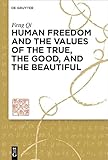Human Freedom and the Values of the True, the Good, and the Beautiful / Feng Qi.
Material type: TextPublisher: Berlin ; Boston : De Gruyter, [2023]Copyright date: ©2023Description: 1 online resource (V, 253 p.)Content type:
TextPublisher: Berlin ; Boston : De Gruyter, [2023]Copyright date: ©2023Description: 1 online resource (V, 253 p.)Content type: - 9783110997217
- 9783110986235
- 9783110985757
- 100
- online - DeGruyter
- Issued also in print.
| Item type | Current library | Call number | URL | Status | Notes | Barcode | |
|---|---|---|---|---|---|---|---|
 eBook
eBook
|
Biblioteca "Angelicum" Pont. Univ. S.Tommaso d'Aquino Nuvola online | online - DeGruyter (Browse shelf(Opens below)) | Online access | Not for loan (Accesso limitato) | Accesso per gli utenti autorizzati / Access for authorized users | (dgr)9783110985757 |
Frontmatter -- Foreword -- Contents -- Chapter 1 Freedom as a Philosophical Category -- Chapter 2 Human Essence -- Chapter 3 Valuation and Value -- Chapter 4 The Value System -- Chapter 5 Myth and Wisdom -- Chapter 6 Truth and Ideals of Life -- Chapter 7 The Good and Moral Ideals -- Chapter 8 Beauty and Aesthetic Ideals -- Chapter 9 Cultivating the Ideal Character -- Chapter 10 The Road to Human Freedom -- Postscript -- Glossary -- Bibliography -- Index
restricted access online access with authorization star
http://purl.org/coar/access_right/c_16ec
This is a philosophical book about the idea of human freedom in the context of Chinese philosophy on truth, the good, and beauty. The book shows that there is a coherent and sophisticated philosophical discourse on human freedom throughout the history of Chinese Philosophy in aesthetics, ethics, and epistemology. Feng Qi discusses the development of freedom in light of the Marxist theory of practice.In the history of philosophy, the relation between thought and existence, which is fundamental to philosophy, has stimulated many debates. These debates, though they have assumed diverse forms in Chinese and Western philosophy, have eventually concentrated on three inquiries: the natural world (the objective material world); the human mind; and the concepts, categories, and laws that are representative forms of nature in the human mind and in knowledge. In Chinese philosophy, the three inquiries are summarized using three notions: qi (气 breath, spirit), xin (心 heart), dao (道 the Way). What relationship do the three notions have with each other? This book explores the way to human freedom through the divergent paths in Chinese philosophy.This book’s investigation of human activities brings the typical Chinese philosophical discourse from the cosmological realm into the realm of human beings as individuals. In this regard, the three inquiries can be described as being about real life, ideals, and individuals.
Issued also in print.
Mode of access: Internet via World Wide Web.
In English.
Description based on online resource; title from PDF title page (publisher's Web site, viewed 06. Mrz 2024)


